Cite this document
(“What Does a Study of Scandinavian Experience Tell Us about the Essay”, n.d.)
What Does a Study of Scandinavian Experience Tell Us about the Essay. Retrieved from https://studentshare.org/macro-microeconomics/1535782-what-does-a-study-of-scandinavian-experience-tell-us-about-the-relationship-between-globalisation-and-the-welfare-state
What Does a Study of Scandinavian Experience Tell Us about the Essay. Retrieved from https://studentshare.org/macro-microeconomics/1535782-what-does-a-study-of-scandinavian-experience-tell-us-about-the-relationship-between-globalisation-and-the-welfare-state
(What Does a Study of Scandinavian Experience Tell Us about the Essay)
What Does a Study of Scandinavian Experience Tell Us about the Essay. https://studentshare.org/macro-microeconomics/1535782-what-does-a-study-of-scandinavian-experience-tell-us-about-the-relationship-between-globalisation-and-the-welfare-state.
What Does a Study of Scandinavian Experience Tell Us about the Essay. https://studentshare.org/macro-microeconomics/1535782-what-does-a-study-of-scandinavian-experience-tell-us-about-the-relationship-between-globalisation-and-the-welfare-state.
“What Does a Study of Scandinavian Experience Tell Us about the Essay”, n.d. https://studentshare.org/macro-microeconomics/1535782-what-does-a-study-of-scandinavian-experience-tell-us-about-the-relationship-between-globalisation-and-the-welfare-state.


